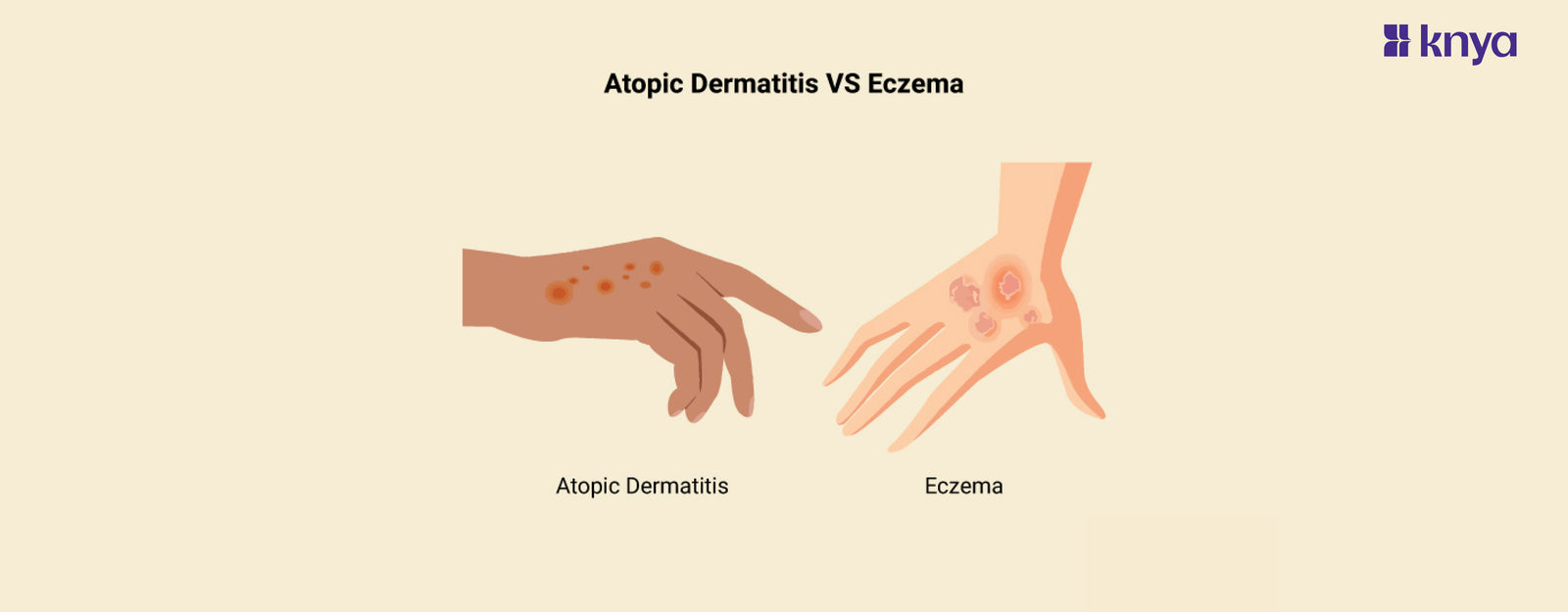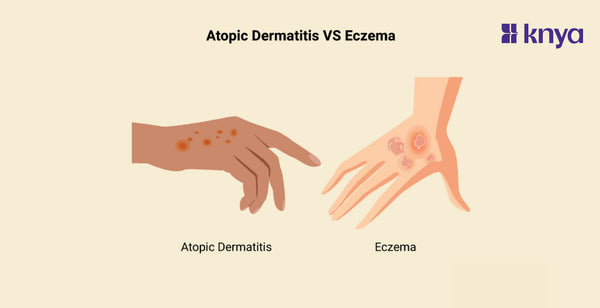Atopic Dermatitis vs Eczema: While often used interchangeably, "eczema" is the umbrella term for an array of itchy, inflammatory skin disorders, with atopic dermatitis being the most prevalent kind. Consider eczema to be a family tree, with atopic dermatitis as the oldest child, acquiring characteristics such as hyperactive immunity and dry, itchy, rashy skin. Contact dermatitis (caused by irritants) and seborrhoeic dermatitis (related to yeast overgrowth) are two more "children" of the eczema family. Understanding the precise form of eczema is essential for efficient treatment and avoiding flare-ups.
Difference Between Atopic Dermatitis and Eczema
Atopic dermatitis (AD) and eczema are often used interchangeably, however it is critical to grasp their relationship and differences.
|
Feature |
Atopic Dermatitis |
Eczema |
|
Terminology |
Specific type of eczema |
General term for various skin conditions |
|
Definition |
Chronic inflammatory skin condition |
Broad term for skin conditions with inflammation, dryness, and itching |
|
Genetic Component |
Strong genetic association |
Genetic association may vary |
|
Age of Onset |
Often begins in childhood, may persist into adulthood |
Can occur at any age, varies by type |
|
Location on the Body |
Commonly affects flexural areas and face in infants |
Can occur on various body parts |
|
Triggers |
Environmental factors, stress, allergens, irritants |
Triggers vary based on specific type |
|
Immunologic Involvement |
Abnormal immune response |
Immunologic basis varies by type |
|
Chronicity |
Chronic condition with periods of exacerbation and remission |
Some forms may be chronic, others acute or subacute |
|
Prevalence |
Common in individuals with family history of atopic conditions |
Can affect individuals with or without a family history |
|
Treatment Approach |
Involves moisturizers, topical corticosteroids, immunomodulators, managing triggers |
Treatment varies based on specific type, may include topical steroids, antihistamines, and other medications |
|
Similarities and Features |
Inflammation, redness, itching of the skin; Management includes avoiding triggers, maintaining good skin hygiene; Impact on quality of life |
Both conditions may benefit from moisturizers, systemic medications may be prescribed, impact on quality of life |
Browse Best Scrubs Collection
What is Atopic dermatitis?
Atopic dermatitis, often known as eczema, is a chronic skin disorder characterised by dry, itchy, and inflammatory spots. It is most frequent in children, typically beginning in infancy, although it can also affect adults. While the specific origin is unknown, it is believed to be a mix of genetics, a compromised skin barrier, and environmental factors. Symptoms might come and go, and while there is no cure, therapies such as moisturisers, topical steroids, and immune-suppressing drugs can help control symptoms and improve quality of life.
Key Features of Atopic dermatitis:
- Atopic dermatitis is a chronic skin condition that tends to flare up and subside over time. It often begins in childhood and can persist into adulthood.
- Atopic dermatitis has a strong genetic component. If you have a family history of the condition, you're more likely to develop it yourself.
- Atopic dermatitis can be triggered by various allergens, including dust mites, pollen, and food sensitivities. Identifying and managing these triggers can help control flare-ups.
- The hallmark of atopic dermatitis is itchy, inflamed skin. The affected areas may appear red, cracked, and scaly. Scratching can worsen the inflammation and lead to secondary infections.
Causes of Atopic dermatitis:
- Genetics: Atopic dermatitis is often linked to a family history of allergies or other skin conditions.
- Immune system: People with atopic dermatitis have an overactive immune system that reacts to triggers, causing inflammation in the skin.
- Environmental factors: Dry weather, harsh soaps, and irritants like wool or dust mites can worsen symptoms.
- Food allergies: In some cases, certain food allergies can contribute to or trigger atopic dermatitis flares.
Symptoms of Atomic dermatitis:
- Dry, itchy skin: This is the hallmark symptom, often occurring on the face, hands, inner elbows, and knees.
- Redness and inflammation: The affected areas may appear red, swollen, and cracked.
- Scaly patches: Skin may become scaly and develop crusts.
- Oozing and weeping: In severe cases, the skin may ooze or weep fluid.
- Thickening of the skin: Long-term scratching can lead to thickening of the skin.
What is Eczema?
Eczema refers to a collection of skin disorders that include itching, inflammation, and irritation. The most common kind is atopic dermatitis, although other varieties include contact dermatitis (caused by irritants or allergens), seborrhoeic dermatitis (dandruff), and dyshidrotic eczema (hand and foot blistering). Each kind has unique triggers and causes, and therapy differs according to the type and severity.
Key Features of Eczema:
- Eczema is actually an umbrella term for a group of inflammatory skin conditions, including atopic dermatitis. Other types of eczema include contact dermatitis, seborrheic dermatitis, and dyshidrotic eczema.
- While some types of eczema, like atopic dermatitis, have an allergic component, others may be triggered by irritants, stress, or environmental factors.
- Like atopic dermatitis, eczema can cause itchy, inflamed skin. However, the specific presentation may vary depending on the type of eczema. For example, contact dermatitis often appears in areas exposed to the irritant, while seborrheic dermatitis commonly affects the scalp and face.
- Treatment for eczema aims to relieve itching and inflammation and prevent flare-ups. This may involve moisturizers, topical steroids, and anti-itching medications.
Causes of Eczema:
- Allergic contact dermatitis: Triggered by direct contact with allergens like latex, nickel, or certain soaps.
- Irritant contact dermatitis: Caused by contact with irritants like harsh chemicals, soaps, or detergents.
- Seborrheic dermatitis: Affects areas rich in oil glands, like the scalp and face.
- Nummular eczema: Coin-shaped itchy patches, often on the hands and legs.
Symptoms of Eczema:
- Similar to atopic dermatitis: Dry, itchy skin, redness, inflammation, scaling, and thickening can occur depending on the type of eczema.
- Additional symptoms: Depending on the type, eczema may also present with:
- Blisters: Small fluid-filled bumps on the skin.
- Crusting: Thick, yellow or brown scabs on the skin.
- Hair loss: In seborrheic dermatitis affecting the scalp.
Shop Best Lab Coats from Here!
Similarities Between Atopic dermatitis (AD) and eczema:
- Both include skin irritation, redness, and swelling.
- Remaining away from triggers and practicing proper skin care are common aspects of management.
- Using moisturisers can help both diseases by preventing dryness.
- Systemic medicines may be administered for both atopic dermatitis and specific forms of eczema in situations of severity.
- Both illnesses can significantly lower quality of life by producing discomfort and interfering with day-to-day activities.
Atopic dermatitis and eczema are often used interchangeably, leading to confusion, but understanding the difference between atopic dermatitis and eczema is crucial for accurate diagnosis and proper care. While eczema encompasses a group of itchy, inflamed skin conditions, atopic dermatitis is the most common type, distinguished by its chronic nature, allergic basis, and tendency to affect specific areas like flexural creases. Other forms of eczema, like contact dermatitis or seborrheic dermatitis, have distinct causes and presentations. Therefore, correctly identifying the type of eczema is essential for implementing effective treatment strategies and managing flare-ups efficiently. Remember, while atopic dermatitis is a type of eczema, not all eczema is atopic dermatitis.
| Check out More Articles | |
| Difference Between Psychosis and Neurosis | |
| Dorsal Vs Ventral | |
| Difference Between Striated and Unstriated Muscles | |





